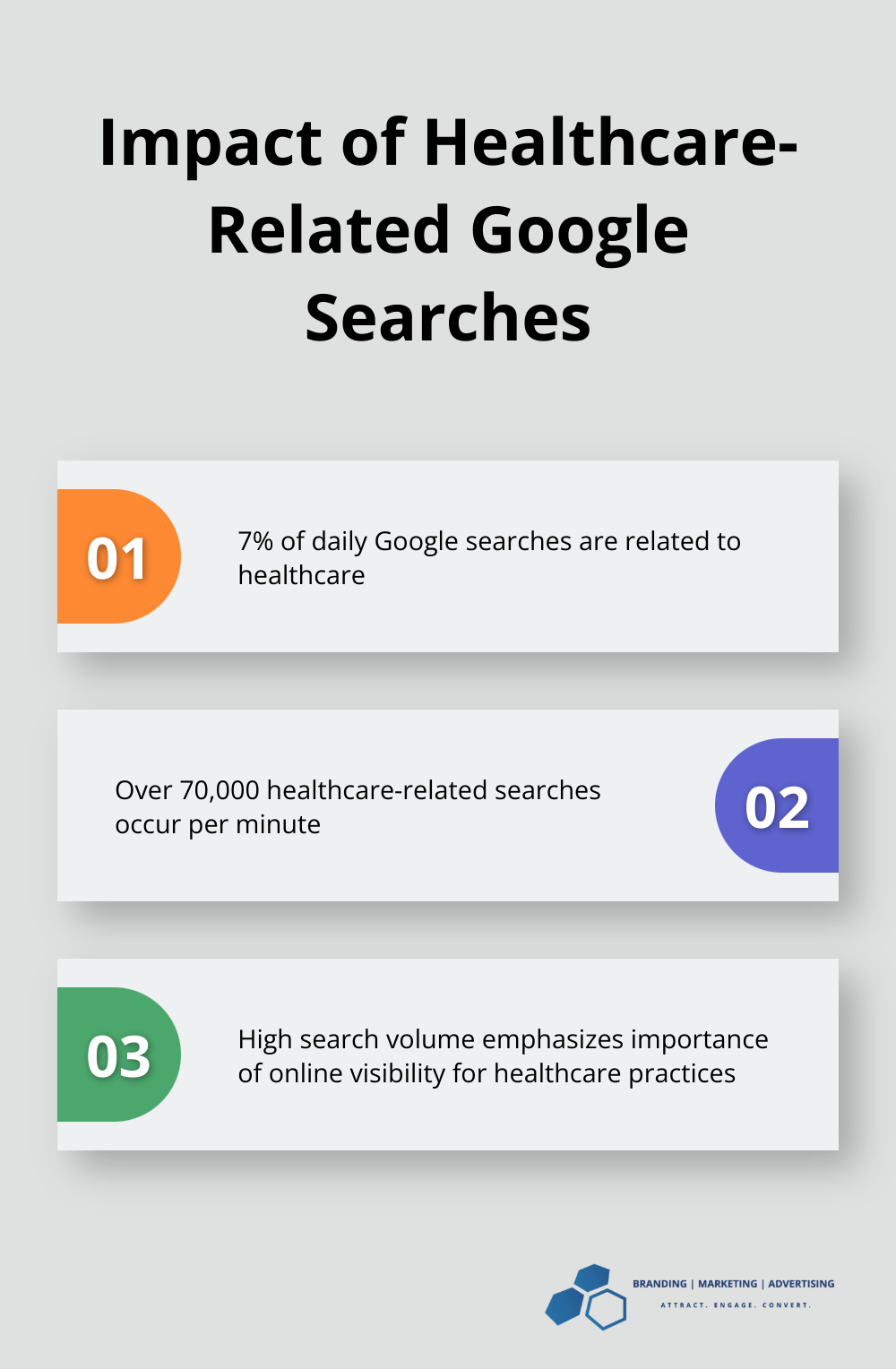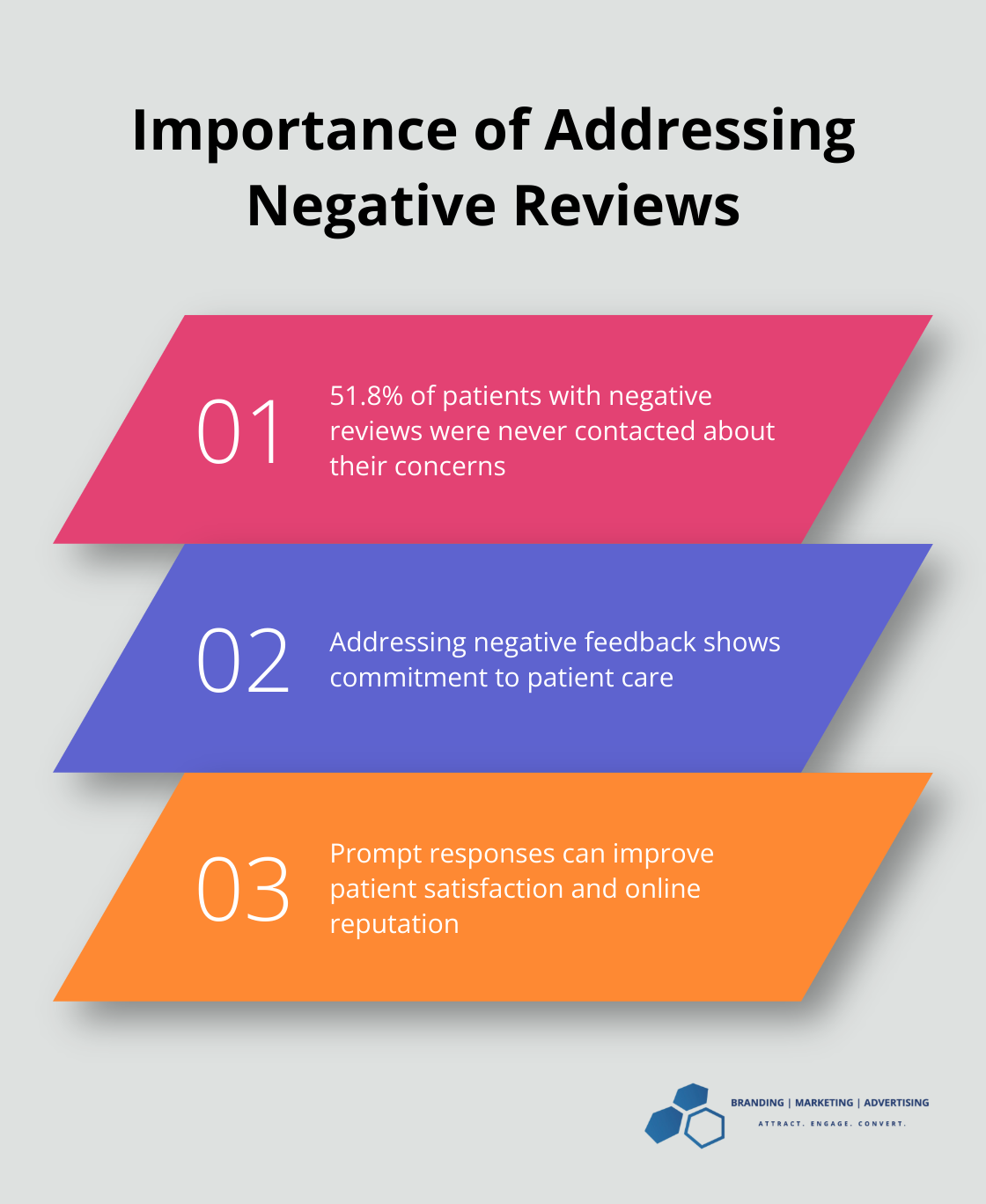Managing Your Healthcare Practice’s Online Reputation
At Branding | Marketing | Advertising, we understand the critical role of medical reputation in today’s digital healthcare landscape.
Your online presence can make or break patient trust, impact search rankings, and shape your professional credibility. In this post, we’ll explore effective strategies for managing your healthcare practice’s online reputation.
From monitoring reviews to leveraging digital tools, we’ll provide actionable insights to help you build and maintain a stellar online image.
Why Your Online Reputation Matters in Healthcare
The Power of Patient Trust
In today’s digital landscape, your healthcare practice’s online reputation can determine your success. A strong online presence transforms medical practices. Trust forms the foundation of healthcare. Patients must feel confident in their provider choice, and the internet plays a crucial role in this decision-making process. A recent healthcare consumer survey revealed that nearly 75% of patients turn to online reviews as the first step when searching for a new physician. This statistic highlights how your online reputation directly impacts patient trust and acquisition.

Consider this scenario: Would you select a doctor with a 2-star rating over one with 5 stars? Most patients wouldn’t. In fact, the Star Ratings system helps people with Medicare compare the quality of Medicare health and drug plans, empowering them to make the best choices. This fact underscores the critical role your online reputation plays in attracting new patients and retaining existing ones.
Enhancing Search Engine Visibility
Your online reputation affects more than just patient trust-it also influences your visibility in search results. Google and other search engines factor in online reviews and ratings when determining local search rankings. The more positive reviews you accumulate, the higher you’ll likely appear in search results.
This visibility proves vital because over 7% of daily Google searches relate to healthcare (totaling over 70,000 searches per minute). If your practice doesn’t show up in these searches due to a poor online reputation, you miss out on a significant pool of potential patients.

Establishing Professional Credibility
In the medical field, credibility reigns supreme. Your online reputation serves as a digital representation of your professional standing. Positive reviews and high ratings not only attract patients but also enhance your credibility among peers and potential partners.
Moreover, a strong online presence opens doors to new opportunities. Whether it’s speaking engagements, research collaborations, or career advancements, your digital footprint shapes your professional trajectory.
The Impact of Patient Feedback
Every patient interaction can affect your online reputation. A single negative review might require up to 40 positive reviews to counteract its effect. Conversely, satisfied patients become powerful advocates for your practice.
That’s why actively managing your online reputation proves essential. You can build a robust online presence that accurately reflects your quality of care by encouraging satisfied patients to leave reviews and addressing negative feedback constructively.
Your online reputation represents more than just a collection of star ratings-it’s a vital asset that significantly influences your practice’s success. In the next section, we’ll explore key strategies for effective management of your healthcare practice’s online reputation.
How to Effectively Manage Your Healthcare Practice’s Online Reputation
Monitor Your Online Presence
The first step in managing your online reputation involves knowing what people say about you. Set up Google Alerts for your practice name and key staff members. Check review sites like Healthgrades, RateMDs, and Vitals regularly. Don’t forget to monitor your social media channels too.
A recent study showed that 84% of patients use online reviews to evaluate doctors. This fact underscores the importance of staying on top of your online presence. Monitoring these platforms allows you to address issues quickly and capitalize on positive feedback.
Respond Professionally to All Feedback
When you receive feedback (whether positive or negative), respond promptly and professionally. Physician surveys are increasingly important for advancing healthcare research and policy. Popular survey topics in 2025 include telemedicine, mental health, and patient feedback.
For positive reviews, a simple thank you can make a significant impact. For negative reviews, address the concern empathetically and offer to take the conversation offline to resolve the issue. Your responses are public and reflect your practice’s professionalism.
Encourage Satisfied Patients to Leave Reviews
Positive reviews boost your online reputation. After a successful appointment, ask satisfied patients to share their experiences online. You might say, “We appreciate your positive experience. If you have a moment, we’d love if you could share your thoughts on Google or Healthgrades.”
Avoid incentivizing reviews, as this can violate platform policies and erode trust. Instead, simplify the review process. You could send a follow-up email with direct links to your review profiles.
Address Negative Feedback Constructively
Negative reviews, while challenging, present an opportunity to demonstrate your commitment to patient care. Respond to these reviews promptly (ideally within 24-48 hours). Express empathy, thank the patient for their feedback, and offer to discuss the matter privately to find a resolution.
A study by Patientpop revealed that 51.8% of patients who left negative reviews were never contacted about their concerns. Addressing negative feedback constructively shows potential patients that you value all feedback and commit to improving your service.

Leverage Digital Tools for Reputation Management
To streamline your reputation management efforts, consider using digital tools. Reputation management software can help you monitor reviews across multiple platforms, respond quickly, and track your online sentiment over time.
Optimize your Google Business Profile to improve your local search visibility. Maintain an active social media presence to engage with patients and showcase your expertise. Implement a patient feedback system to gather insights and address concerns before they become public reviews.
Your online reputation reflects your real-world care. These strategies will help you build a strong, positive online presence that accurately represents your practice’s commitment to excellent patient care. In the next section, we’ll explore how to leverage these digital tools effectively to enhance your online reputation further.
Digital Tools for Better Online Reputation
In today’s digital age, managing your healthcare practice’s online reputation requires more than just monitoring reviews. Advanced digital tools enhance and protect your online presence. Let’s explore how these tools can revolutionize your reputation management strategy.
Reputation Management Software
Reputation management software streamlines the process of monitoring and responding to patient feedback across multiple platforms. These tools aggregate reviews from various sites, allowing you to respond promptly and effectively. Investing in such software can increase reviews, rankings, and trust for medical and healthcare practices.
Advanced reputation management software tracks your online presence across all major review sites. It provides real-time alerts for new reviews, enabling swift responses to both positive and negative feedback. This proactive approach helps maintain a positive online image and demonstrates your commitment to patient satisfaction.
Google Business Profile Optimization
Your Google Business Profile (GBP) often serves as the first point of contact between your practice and potential patients. Optimizing this profile is essential for local search visibility and reputation management. Investing time to set up, optimize, and regularly monitor your profile can impact your practice’s growth, attracting new patients and strengthening existing relationships.
GBP optimization ensures your profile is complete, accurate, and engaging. This includes adding high-quality photos, updating business hours, and responding to reviews. The GBP’s Q&A feature addresses common patient queries, showcasing your expertise and improving patient trust.
Social Media Presence
An active social media presence is vital for reputation management in healthcare. It provides a platform to showcase your expertise, engage with patients, and control your narrative. Tailored social media strategies focus on platforms where your target audience is most active (whether it’s LinkedIn for professional networking or Instagram for visual storytelling). Content creation and curation highlight your expertise, share patient success stories (with permission), and provide valuable health information.
Patient Feedback Systems
A robust patient feedback system allows you to address concerns before they become public reviews. Customized patient feedback systems integrate seamlessly with your practice management software. These systems send automated surveys after appointments, allowing you to gather valuable insights and address any issues promptly. This proactive approach not only improves patient satisfaction but also encourages more positive online reviews.
Final Thoughts
Your medical reputation in the digital healthcare landscape impacts your practice’s success significantly. Effective reputation management involves monitoring your online presence, responding to feedback professionally, and addressing negative comments constructively. These efforts, combined with digital tools like reputation management software and optimized Google Business Profiles, help build a stellar online image.
Every patient interaction contributes to your overall reputation. A strong online reputation leads to increased patient trust, improved search engine rankings, and enhanced professional standing in the medical community. The importance of online reputation management will continue to grow as the healthcare industry evolves.
At Branding | Marketing | Advertising, we help healthcare practices navigate online reputation management complexities. Our team provides tailored strategies to enhance your digital presence (ensuring your online reputation reflects your quality of care). Take control and start building a strong, positive online presence today.












